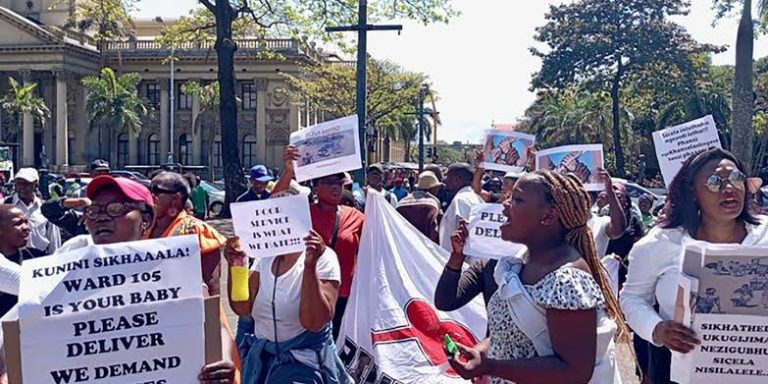Under the warm Durban sun, angry voices rose from the city’s iconic beachfront — not in celebration, but in frustration. Holding up signs that read, “Give us the services we pay for!”, a group of determined residents marched along the promenade on Saturday, demanding what they say has been denied for far too long: dignity through service delivery.
The protest, led by the eThekwini Ratepayers Protest Movement (ERPM) and supported by the North Beach Ratepayers Association (NBRA), shone a spotlight on the growing discontent with poor municipal services, unexplained tariff hikes, and a lack of transparency from city officials.
“This city is falling apart,” said Asad Gaffar, ERPM’s chairperson. “We’re being asked to pay more for less — and we’re done being quiet about it.”
Many residents feel they’re being billed for services that either don’t exist or are poorly delivered. Some described waiting months, even years, for basic issues like potholes, broken playgrounds, and unattended street rubble to be fixed — only to watch unnecessary projects get fast-tracked elsewhere.
NBRA chairperson Rookaya Vawda passionately urged fellow residents to join the fight. “We can’t wait anymore. If we don’t speak up now, nothing will change,” she said. “It’s not just beachfront residents — people in the suburbs are struggling too. We’re tired of chasing departments that don’t respond.”
She described how the NBRA had even created a community WhatsApp group to track complaints — requiring residents to submit reference numbers so they could personally follow up and escalate unresolved issues.
“There’s a total breakdown in communication,” Vawda explained. “We’re not asking for luxury — just the basics we already pay for.”
Frustration also grew over questionable decisions on public works. Vawda pointed out how a quiet road was recently resurfaced despite being in good condition, while main roads remain riddled with cracks. Nearby parks, she said, are poorly maintained with broken playgrounds and limited access. “Who’s making these decisions? Who’s getting these contracts? We want to know.”
Adding to the sense of injustice is the growing list of levies and fees. Flat owners are charged R40 monthly for the Community Schemes Ombud Service — an agency meant to mediate disputes in residential buildings. But many say it’s failing them.
On the beachfront, the protest caught the attention of passersby like Ntsiki Majola, a father out with his children. After learning about the protest, he stopped to express his support. “We’re fed up,” he said. “I pay my bills, I follow the rules, and yet we get nothing in return. Now we hear about plans for a rehab center in Illovo, and no one even consulted us. What about our safety?”
Gaffar called for an immediate halt to all proposed tariff hikes until there’s proof of improved services. “We need full disclosure — where has our money gone? And what’s the plan for future spending?”
In response to public pressure, the municipality has revised its proposed 2025/26 tariff increases, slightly reducing some rates. But for many residents, the changes are too small — and the trust is already broken.
Revised Tariff Highlights:
Property Rates: 6.5% cut to 5.9%
Water: Residential increase dropped from 15% to 13%
Sanitation: Down from 13% to 11%
Refuse: 9.9% to 9%
Electricity: A steep 12.72% increase remains, as guided by NERSA
For now, the message from Durban’s beachfront is loud and clear: residents are no longer staying silent. They’re paying attention — and they’re demanding answers.

